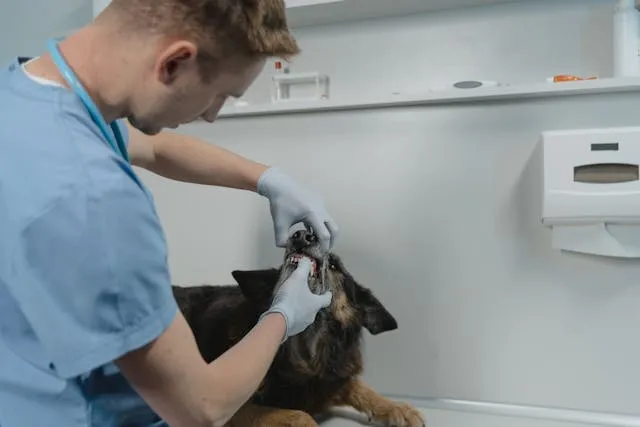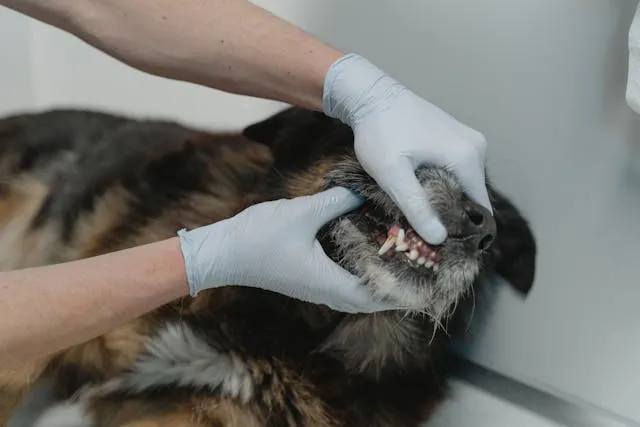Published
- 3 min read
Essential Dental Care for Dogs and Cats

Dental care in dogs and cats is a crucial aspect of their overall well-being that is often overlooked. Just as we need to maintain good oral hygiene, our pets also require regular dental attention to prevent diseases and ensure a long, healthy life. Below is a comprehensive guide on essential dental care for dogs and cats.
Why is Dental Care Important for Pets?
Dental diseases are common in both dogs and cats, especially as they age. Dental problems can lead to severe complications, such as infections that can spread to other vital organs. Additionally, the buildup of plaque and tartar can cause pain and discomfort that affect your pet’s quality of life.

Veterinarian checking dog's teeth.
Signs of Dental Problems in Pets
It’s important to watch for the following signs that may indicate dental problems in your pet:
Persistent bad breath: While a slight odor is normal, a strong, persistent smell may be a sign of dental disease.
Inflamed or bleeding gums: Healthy gums should be pink and firm, not red or swollen.
Loss of appetite or difficulty eating: If you notice your pet chewing only on one side or avoiding food, they may have dental pain.
Tooth loss: This is an advanced sign of dental disease that requires immediate veterinary attention.
Excessive drooling: This can be another sign of pain or discomfort in the mouth.

Dog teeth revision.
Essential Steps for Dental Care for Dogs and Cats
1. Regular Tooth Brushing
Brushing is the best way to prevent plaque and tartar buildup. Use a toothbrush and toothpaste specifically designed for pets. Start slowly, allowing your pet to get used to the process. Ideally, brush your pet’s teeth daily, but brushing at least three times a week can be effective.
2. Appropriate Diet
Some pet foods are formulated to help keep teeth clean. These foods have a special texture that helps reduce plaque while your pet chews. Consult with your veterinarian to choose the best food for your pet’s dental health.
3. Dental Chews and Toys
There are toys and treats designed to promote dental health in pets. These products can help clean teeth and massage gums, reducing plaque buildup. However, they should not replace regular brushing.
4. Regular Veterinary Visits
It is crucial to take your pet to the veterinarian for regular dental check-ups. A professional can perform a thorough dental cleaning under anesthesia and detect any dental issues in their early stages.
5. Use of Dental Rinses and Water Additives
There are specific products that can be added to your pet’s water to help control plaque and maintain fresh breath. Consult your veterinarian before introducing these products into your pet’s routine.
Conclusion
Maintaining good dental health in dogs and cats not only improves their quality of life but can also prevent serious long-term health issues. Incorporating dental care into your pet’s routine is an investment in their well-being. Remember that good dental care is essential to keeping your pet healthy, happy, and with a bright smile!
Implementing these dental care practices into your pet’s daily routine will not only keep them free from pain and discomfort but also strengthen your bond, ensuring many happy years together.
Thank you for taking the time to read this article. We hope you found it helpful!
This article solely reflects the author’s opinion and should not be taken as professional advice.